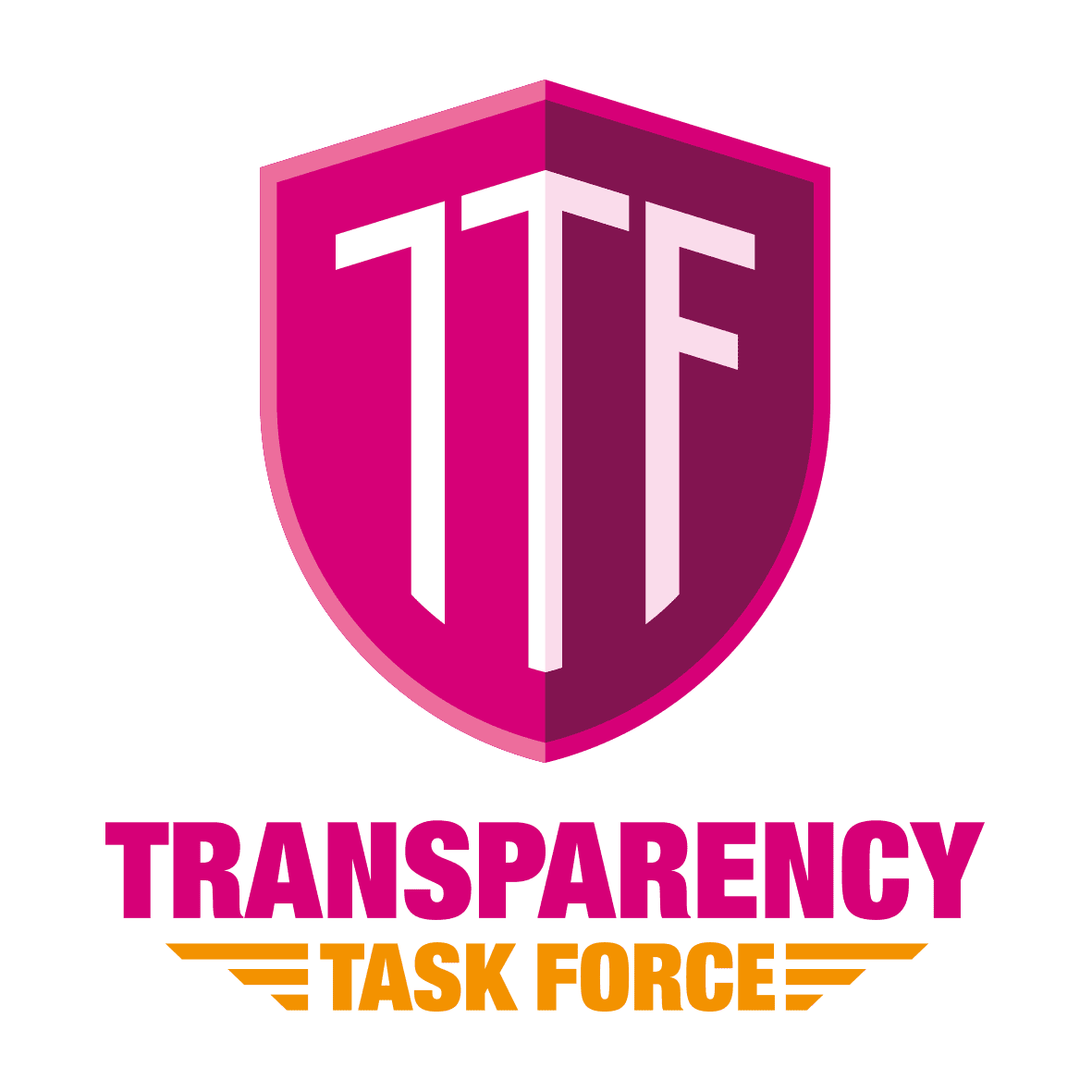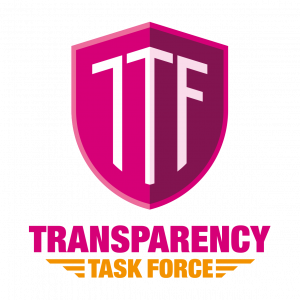Manifesto of the Transparency Task Force
A public declaration of policy and aims
The Transparency Task Force is a Certified Social Enterprise, meaning we are governed by our Articles of Association, which specify that we must serve society and operate in keeping with our mission, vision and objectives.
Our Mission is to promote ongoing reform of the financial sector, so that it serves society better.
Our vision is to build a highly respected, international and influential institution that helps to ensure consumers are treated fairly by the financial sector.
The purpose of this Manifesto is to articulate our mission, vision and objective such that all stakeholders can understand our purpose.
We hope that those who take the opportunity to understand our work will conclude as we do; that our cause is both noble and necessary, and worthy of engagement and support.
We believe that the Financial Sector is profoundly important to the wellbeing of society, economic stability and political stability. Whilst the Financial Sector has many virtues and virtuous people within it, we must also acknowledge and confront its many failings and flaws.
These include but are not limited to:
- conflicts and misalignments of interest
- short-termism
- a general lack of transparency
- hidden costs and risks
- insufficient client-centricity
- scams and scandals
- ineffective regulation, with varying degrees of regulatory capture
- reward mechanisms that sometimes encourage malpractice
- mindsets of “profit before principles” and “money before morals”
- a general lack of good governance
- varying degrees of regulatory capture; and
- a general lack of market integrity
These failings and flaws are not insignificant. They matter a great deal, because they inhibit and undermine the potential for the finance sector to do what it’s meant to do – to serve society in a transparent, truthful and trustworthy way.
The overall end result is that we have a finance sector that many people often find difficult to understand and engage with; and it’s the least trustworthy sector of all, according to many independent sources including the Edelman Trust Barometer and Violation Tracker.
Low levels of trust towards the finance sector shouldn’t be a surprise, given the frequency of financial scams and scandals and because of the catastrophic financial and societal carnage due to the Global Financial Crisis, which in turn was caused by the financial sector.
In all the countries in which we operate there is as a desperate need to ramp up the levels of regulatory protection for consumers. Many members are concerned that that very powerful and well-resourced lobbying by the sector and its trade bodies, particularly those representing the interests of the banks, are acting as a brake on pro-consumer reform. It is easy to conclude that these concerns are valid, when you consider for example that typically more than 90% of the responses to financial services consultations are very well-prepared documents produced by major industry players; with sometimes just a handful of responses coming from organisations such as the Transparency Task Force, which authentically embrace and speak up for the consumer perspective.
Furthermore, there are many highly respected academic papers such as this one entitled “How can we mitigate capture in financial regulation?” that articulate the corrosive consequences of regulatory capture, which we suspect to be at the heart of many of the issues we address.
Clearly, there is a great deal of work to be done before consumers are treated fairly by the financial sector.
We’re up for doing that work; it’s what we do…
The Transparency Task Force and its members seek to rebalance the financial ecosystem in favour of the society it is meant to serve. This effort is reflected in our Finance Development Goals, which establish a framework for finance reform in the same way that the United Nations’ Sustainable Development Goals are a framework for planetary change.
The primary beneficiaries of our work will be consumers; but the sector itself will also benefit through improved market conduct and increased trust in the products and services it provides.
Our objective is to carry out a broad range of activities that are designed to help drive the positive, progressive and purposeful reform that the finance sector desperately needs
These activities include, but are not limited to:
- Identifying the problem areas in the financial sector and considering how they should be remedied
- Building a collaborative, campaigning community; the larger it is the more influence it can have in driving the change that is needed
- Raising awareness of issues; so that society better understands the problems that exist in the financial sector and how they can be dealt with
- Engaging with people who can make change happen; because through such dialogue we can influence thinking, policy making and market conduct
- Galvanising support for the idea that the finance industry needs to be more transparent and fair; because the more support for change there is, the more change there can be
- Running campaigns to change the financial services industry for the better; because campaigns create the opportunity to focus energy and effort on specific issues
- Harnessing the transformational power of transparency by embracing and utilising the long-established idea that “sunlight is the best disinfectant”
- Initiating and facilitating conversations, on an international basis, that help to identify and deal with the root causes of the problems so they can be properly dealt with
- Reforming conduct in the sector to help rebuilding its trustworthiness and confidence
- Convening meetings and running events where insights and ideas can be shared; and meaningful discussions can be had about what needs to change
- Constructively criticising the status quo, whereby we describe problems but also offer potential solutions
- Bringing together an eclectic mix of people with a wide range of perspectives, such as members of the public, academics, policymakers, politicians, leaders of trade bodies and professional associations, regulators, bankers, pensions industry professionals, asset managers, researchers, media professionals and so on; so that we are able to build consensus in a collaborative and collegiate manner
- Publishing the Transparency Times, our weekly newsletter, which goes out to thousands of members. Through it we share ideas and update our members on relevant news and developments, thereby helping to create a well-informed and highly engaged community
- Awarding Transparency Trophies to exemplary individuals within the financial sector who are helping to make a positive difference. This in turn encourages others to do the same
- Publicising our pro-consumer agenda in the media through articles and comment pieces. We have appeared in most UK national newspapers, the trade press, BBC Radio 4 and CNBC TV. Highlights have been pieces on the front page of the Financial Times to being significant contributors to an award-winning BBC Radio 4 programme, The Transparency Detectives. We always seek to tell the consumer’s side of the story.
- Publishing our book entitled “Why we must rebuild trustworthiness and confidence in financial services; and how we can do it.” Our book has contributions from 65 subject-matter experts from around the world and helps to articulate a coherent, evidence based message about not just the need for change; but also how to make it happen
- Interrogating information that’s put out by the industry, challenging suspicious misinformation and calling out any falsities. For example, we called out the Investment Association’s claim that there were no hidden costs and charges in investments. We wrote articles and comments urging them to come clean on charges. Our challenge was successful – it resulted in the Investment Association removing a misleading press release from their website
- Building an international network of Ambassadors. Our Ambassadors are individuals that are strongly aligned to our cause and want to be seen to be actively supporting our work. Our Ambassadors are highly credible individuals and many of them are well-known
- Making useful connections between people and organisations. We are at the epicentre of an ever-expanding network of contacts that we are systematically growing. As such we are frequently able to introduce people to like-minded individuals. As well as connecting individuals we also connect other campaigning and advocacy groups with similar objectives to our own, thereby helping to enhance our collective effectiveness
- Creating and running specialist groups of members that work together to bring about change. Our specialist groups tackle issues within specific sections of the industry – such as pensions, investment, banking, foreign exchange and so on. Each group is made up of subject matter experts with the knowledge and expertise to identify what problems need to be dealt with. Group members agree campaign objectives, engage with regulators, respond to consultations and encourage rule-makers to make better rules
- Carrying out research so we have credible evidence to support our campaign work. Robust research helps us to champion the consumer’s cause. For example, we identified all the costs and charges pension savers were exposed to – this research helped us argue that investment companies need to make charges more transparent; our case was featured on the front page of the Financial Times
- Campaigning for the UK Government to open inquiries. We have successfully campaigned for 2 so far – one on the issue of the need for greater transparency on costs and charges in pensions and investments; and the other on pension scams. Both inquiries have been carried out by the Work and Pensions Select Committee. Such inquiries can lead to positive reforms that can benefit millions of people, for example by helping to give people better value-for-money pension products and thereby providing greater financial security in retirement; and also in helping to better-protect consumers from scammers
- Running special meetings in Parliament. We have run 4 so far: on banking, costs and charges in investment, financial stability and pension scams. We have used these events to help promote the idea of inquiries being opened and new All-Party Parliamentary Groups being formed.
- Helping to initiate the creation of two All-Party Parliamentary Groups. An All-Party Parliamentary Group is an interest group that occupies a strategic and effective position within Parliament. It is cross-party, with a minimum number of parliamentarians from the Government and the official opposition, and cross-house, made up of both peers and MPs. We have so far initiated 2 All-Party Parliamentary Groups – one on Pension Scams and another on Personal Banking and Fairer Financial services. The Transparency Task Force is the Secretariat to both.
- Responding to relevant regulatory, industry body and government consultations to make sure politicians, policymakers and regulators hear the consumer’s point of view
- Convening meetings with the financial regulators to speak up on behalf of consumers’ interests. For example, we have convened meetings with the Financial Conduct Authority and the Bank of England’s Climate Hub about the need for reform within the asset management industry.
- Capitalising on the awesome power of social media to spread our message, promote our many and varied activities and recruit new members. We operate our own LinkedIn Group and Twitter account. We have just started using Facebook and have already created a YouTube Channel, called TTF TV, where we make available video recordings of our many symposia.
- Gathering Transparency Statements, where our members are able to articulate their support for transparency by providing a statement that begins with the words “I believe there ought to be greater levels of transparency in financial services, because..……….” and completed however they wish.
- Creating TTF International, our network of members in many countries around the world. This has been made possible because of the events we have run in Dublin, Amsterdam, Brussels, Zurich, Boston, New York, Washington DC, Singapore, Hong Kong, Sydney and Melbourne
- Speaking about the need for greater transparency in financial services at conferences around the world; many in the UK but also in Hong Kong and India
- Organising and mobilising individuals and organisations that want to be part of an international movement to purposefully fix what’s wrong in financial services
To help turn our reform ideas into reality we have a strategy for driving change.
Our strategy for driving change is to bring together the thinking of two groups of people:
#1, Those with a sense of “passion & purpose” about what needs to change, such as:
- The thought-leaders that speak at our many symposia
- The ethically-minded financial services professionals, enlightened market participants and leading academics who are involved with our many groups
- Our volunteers who work together to produce important consultation responses, discussion documents and white papers
- The subject-matter experts who shared their progressive thinking in our book, “Why we must rebuild trustworthiness and confidence in financial services; and how we can do it”
- Our members that engage with the media to help raise awareness of our work and the issues that concern us
- The leaders of the many campaign and advocacy groups that are closely-aligned to the TTF’s overall objectives to create a finance industry that serves its markets as it should – efficiently, ethically, honourably and transparently and truthfully
And the group #2, those with the “power & position” to make change happen, including politicians, policymakers and regulators.
Two very good examples of how we have used our strategy for driving change would be the two inquiries we have played a key role in getting opened:
- The Work & Pensions Select Committees inquiry on pension costs and transparency that took place in 2016
- The Work & Pensions Select Committees inquiry on pension scams that took place in 2020/21
Two further examples of our strategy for driving change in action are the two All-Party Parliamentary Groups that we are the Secretariat for:
The All-Party Parliamentary Group on Pension Scams
The All-Party Parliamentary Group on Personal Banking and Fairer Financial Services
The purpose of setting out our Strategic Objectives for 2021 is to explain our priorities:
General Campaigning Goals
- Each one of our 25 Groups have campaign objectives and they vary in strategic importance. Those of the greatest importance are:
- Scambusters
- Regulators Watch
- Violation Tracker
- Secretariat to the APPG on pension Scams
- Secretariat t the APPG on Personal Banking & Fairer Financial Services
- The International League of Ethical Financial Services Leaders
- Consultation Responses; we plan to respond to at least 6 consultations this year with at least 2 of those being consultations outside the UK.
General Organisational Goals
- Capability-building
- Institution-building
- Stabilising our financial position, through:
- Establishing our Subscription Model; achieving 500 Subscription Members
- Applying for grants
- Undertaking Crowdfunding activity
- Improving member engagement
- Increasing our range of event types by launching Film Club events and Book Club events
- Securing first class speakers for the events we run
- Increasing our Ambassadors to 500
- Gathering 1,000 Transparency statements
- Doubling our Social Media contacts to 20,000 people
- Recruiting more staff
Strategic objectives for the UK:
- Growing our UK membership from 2,000 to 2,500
- Completing our VIPs Mind-Map for the UK
- Relationship management of the VIPs
- Successfully establishing the 2 APPGs for which we are the Secretariat
- Increasing our engagement with Parliamentarians, Policymakers and Regulators
- Attendance and speaking at events
- Social media interaction
- Key campaigns
- Royal Commission
- Identifying and helping to remedy regulatory failure
- Pension scams
- Transparency on costs and charges
- Authorised push payment fraud
- Bringing Violation Tracker to the UK
- Optimisation of Corporate Actions for Pension Schemes
Strategic objectives for TTF USA and TTF Australia:
- Growing our membership to 5,000 members in each country
- Completing our VIPs mind-map for both countries
- Relationship management of the VIPs
- Increasing understanding of the key issues in each country
Strategic objectives for TTF Europe, TTF Asia, TTF Canada and TTF South Africa:
- Starting our VIPs mind-map for each country
- Starting to relationship manage the VIPs
All societies around the world need to be served by a trustworthy financial sector.
The Transparency Task Force exists to drive the positive, progessive and purposeful reform that is so desperately needed to make that aspiration a reality.
We ask all stakeholders to engage with and support our cause; it is both noble and necessary.
End.


